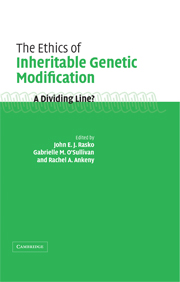Book contents
- Frontmatter
- Contents
- List of contributors
- Foreword: shopping at the genetic supermarket
- List of abbreviations
- Acknowledgments
- 1 Is inheritable genetic modification the new dividing line?
- 2 The science of inheritable genetic modification
- 3 Nuclear cloning, embryonic stem cells, and gene transfer
- 4 Controlling bodies and creating monsters: popular perceptions of genetic modifications
- 5 Inheritable genetic modification as moral responsibility in a creative universe
- 6 Ethics and welfare issues in animal genetic modification
- 7 Radical rupture: exploring biologic sequelae of volitional inheritable genetic modification
- 8 “Alter-ing” the human species? Misplaced essentialism in science policy
- 9 Traditional and feminist bioethical perspectives on gene transfer: is inheritable genetic modification really the problem?
- 10 Inheritable genetic modification and disability: normality and identity
- 11 Regulating inheritable genetic modification, or policing the fertile scientific imagination? A feminist legal response
- 12 Inheritable genetic modification: clinical applications and genetic counseling considerations
- 13 Can bioethics speak to politics about the prospect of inheritable genetic modification? If so, what might it say?
- Glossary of scientific terms
- Index
13 - Can bioethics speak to politics about the prospect of inheritable genetic modification? If so, what might it say?
Published online by Cambridge University Press: 29 January 2010
- Frontmatter
- Contents
- List of contributors
- Foreword: shopping at the genetic supermarket
- List of abbreviations
- Acknowledgments
- 1 Is inheritable genetic modification the new dividing line?
- 2 The science of inheritable genetic modification
- 3 Nuclear cloning, embryonic stem cells, and gene transfer
- 4 Controlling bodies and creating monsters: popular perceptions of genetic modifications
- 5 Inheritable genetic modification as moral responsibility in a creative universe
- 6 Ethics and welfare issues in animal genetic modification
- 7 Radical rupture: exploring biologic sequelae of volitional inheritable genetic modification
- 8 “Alter-ing” the human species? Misplaced essentialism in science policy
- 9 Traditional and feminist bioethical perspectives on gene transfer: is inheritable genetic modification really the problem?
- 10 Inheritable genetic modification and disability: normality and identity
- 11 Regulating inheritable genetic modification, or policing the fertile scientific imagination? A feminist legal response
- 12 Inheritable genetic modification: clinical applications and genetic counseling considerations
- 13 Can bioethics speak to politics about the prospect of inheritable genetic modification? If so, what might it say?
- Glossary of scientific terms
- Index
Summary
Bioethics, inheritable genetic modification, and politics: informing the policy-making craft
New genetic knowledge and technique continue to generate a torrent of possibilities and associated worries. We hope we might be diagnosed more effectively, treated with pharmaceuticals tailored to our genomes for improved efficacy and diminished side effects, or cured by new somatic cell gene transfer (SCGT) technologies. But we also fear that we might be shunned from the workplace if our employers learn of the vulnerabilities foretold by our genomes, denied health insurance on the basis of genetic test results though we are currently asymptomatic, or misled regarding the prospects of success and the risks of harm while serving as subjects of experimental gene-based research. The possibilities and worries surrounding inheritable genetic modification (IGM), in particular, are remarkable in their variety, nuance, and difficulty.
The focus of these possibilities and worries will vary according to the roles and responsibilities of those who may soon face choices about IGM. First, for parents, there is the hope that future children might enjoy lives free of genetic contributions to burdensome or deadly disease and disability, but also the fear that parents might choose badly – whether due to an overabundance of daring or caution, concern or neglect, perfectionism or ennui, piety or irreverence. If parents do engineer their children, will they be volunteering them as subjects in a grand research project, with risks that are unknowable and, potentially, equally grand?
- Type
- Chapter
- Information
- The Ethics of Inheritable Genetic ModificationA Dividing Line?, pp. 243 - 278Publisher: Cambridge University PressPrint publication year: 2006
- 1
- Cited by



